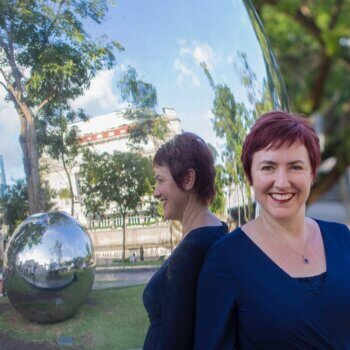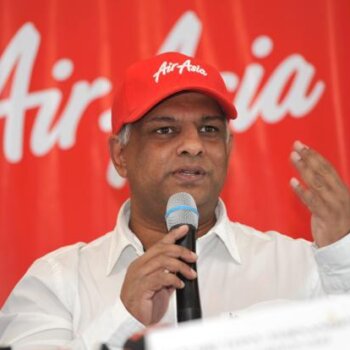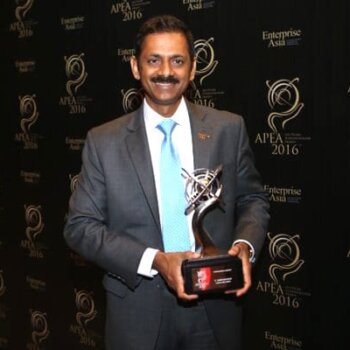Patricia Reed has traveled the world and ended up in tech consulting quite by accident!
What’s your story?
I have been greatly influenced by living on four continents and working in IT. Originally from Texas, I moved to Oslo, Norway with my family as a child. Then again my junior year in college to the Sorbonne in Paris. In 1994, I moved to Belgium, and spent 12 years in Brussels, Belgium, with one amazing year in the middle in Goma, Democratic Republic of Congo, and now eleven years in Singapore.
My entry into tech happened in the early part of my career. I was job-searching for an entry-level position with a firm that would provide me with opportunities for professional growth. I interviewed for a temp job to replace a secretary during her maternity leave. My ‘career’ had not gone as I planned, and I was not at all interested in the role, but it was for a relative start-up called Cisco Systems, and my friend had insisted that I go. Reluctantly, I went, having sworn I would NEVER take another admin job, no matter HOW much I wanted to get into the company.
My luck changed when I sat down with the interviewer and he asked, “So, you’re here for the Sales role?” Pause. I glanced down and saw that it was indeed my CV in front of him. My heart skipped a beat, then, “Why yes, I’m very excited about it. Could you tell me more?” Instantly, my level of interest shifted. I listened intently to all of the details he shared.
I spent nine great years at Cisco, moved from Brussels to Singapore, and have been in Tech consulting and leadership ever since.
What excites you most about your industry?
The constant change! There’s no boredom or fat in tech. There’s always something new developing, building, and challenging the status quo. Organizations are in constant flux too, reflecting technology. AI, Cloud, IoT, the sharing economy technologies, driverless vehicles, robotics- what business is NOT impacted by technology today?
What’s your connection to Asia?
Our family actively pursued a move to Singapore eleven years ago. My husband and I were keen for a change of scenery but were determined to move BOTH of our careers. Neither one of us wanted the other to have to sacrifice, (and neither one of us wanted to bear the burden of being the sole breadwinner).
I thought the opportunity for my children to grow up learning Mandarin, and working in what we thought was the biggest geography for growth in the world was a very exciting prospect. Singapore offered opportunities for both of us that most places weren’t able to offer.
Favorite city in Asia for business and why?
I love Tokyo. The richness of the culture, the level of professionalism and courtesy of Japanese colleagues, the amazing food, the different customs and their appreciation and care for their city.
My first trip there, I learned a lot about working hours in Japan. At our first formal meeting with our potential high-profile customer, my only meeting with a professional business translator, we had managed to get our company to agree to fly in a talented Russian engineer from London who had worked on a project they were supposedly very keen to hear from. Five minutes into Vladimir’s carefully prepared presentation, one of the five men from the client fell asleep, put his head back and slept! I could not believe my eyes. I elbowed my Japanese colleague and whispered, irritated, wanting to understand what was going on. My colleague explained in few words that it was ok. I learned that it is apparently customary for the most senior member of the meeting to snooze, as they work and stay out so late.
I made rookie mistakes I learned from – I think they must have thought I was an ogre at one point. I remember having a really bad cold and turning completely around to blow my nose while out at dinner. When I turned back around, five Japanese male colleagues were in shock. The blood had completely drained from their faces and were pie eyed. I was like ‘oops?’ I won’t do that again!
The business that I closed with Japanese companies remains some of my favourite work, in terms of meaningful relationships and richness and complexity of the projects.
What’s the best piece of advice you ever received?
Years ago, a boss I loved told me, “not everything is black and white, there are so many shades of gray.” It is obvious now, but at the time, it really helped me. It is sometimes hard to navigate the situations we can find ourselves in. Withholding judgement, and responding with curiosity to understand intentions behind actions serve well.
Who inspires you?
Entrepreneurs, Hillary Clinton, (she’s like the Energizer bunny- just keeps on going), and Elon Musk.
What have you just learnt recently that blew you away?
There are a few things, but I’ll choose the one related to my industry- the two female tech founders of “Witchsy” invented a male co-founder to combat sexism from investors, but also from their own employees. “Keith” had a much easier time giving direction to their employees than they did.
Another, (if I’m permitted!) is related to global warming.
If Americans substituted beans for beef, the U.S. could still come close to meeting its 2020 greenhouse-gas emission goals, pledged by President Barack Obama in 2009. EVEN if nothing about the energy or transportation system changed—and even if people kept eating chicken and pork and eggs and cheese—this one dietary change could achieve somewhere between 46 and 74 percent of the reductions needed to meet the target.
https://www.theatlantic.com/health/archive/2017/08/if-everyone-ate-beans-instead-of-beef/535536/
If you had your time again, what would you do differently?
As I get older, I realize that there are so many things that I could have done differently, but ultimately, the choices I made were the best available choices I had at the time. They have made me who I am today.
However, as far as investments, I would have leveraged myself more in rental real estate. It’s fantastic passive income, and I enjoy having parallel active and passive strategies at work.
How do you unwind?
Talk to friends, social media, meditation, Audible books, a good Netflix series.
Favourite Asian destination for relaxation? Why?
Anywhere that is without connectivity, in nature, with the sounds of nature all around. Hard to find. One of my favourite places was at Khao Sok National Park, near Phuket, on a paddle trip. It was a very rudimentary camp, bamboo bungalows floating on the lake.
Everyone in business should read this book:
“Good Strategy Bad Strategy: The Difference and Why It Matters” by Richard Rumelt. I hardly ever meet a business leader with a clear understanding of strategy. It explains the critical components of a good strategy. A few takeaways: 1) too many companies mistakes goals for a strategy. $5 million in revenue by Dec. 2018 isn’t a strategy, it’s a goal. LOT of companies do this! 2) Strategies are not just what you WILL do, it’s also what you WON’T do. Great book.
Shameless plug for your business:
I excel at B2B leadership and consulting. Getting to the bottom of what is not working and how to fix it. I’m an excellent coach/advisor and love working to help businesses succeed.
How can people connect with you?
LinkedIn: https://www.linkedin.com/in/patriciareed/
Twitter handle?
Pareedus
—
This interview is part of the ‘Callum Connect’ series of more than 500 interviews
Callum Laing is an entrepreneur and investor based in Singapore. He has previously started, built and sold half a dozen businesses and is now a Partner at Unity-Group Private Equity and Co-Founder of The Marketing Group PLC. He is the author two best selling books ‘Progressive Partnerships’ and ‘Agglomerate’.
Connect with Callum here:
twitter.com/laingcallum
linkedin.com/in/callumlaing
Download free copies of his books here: www.callumlaing.com
































